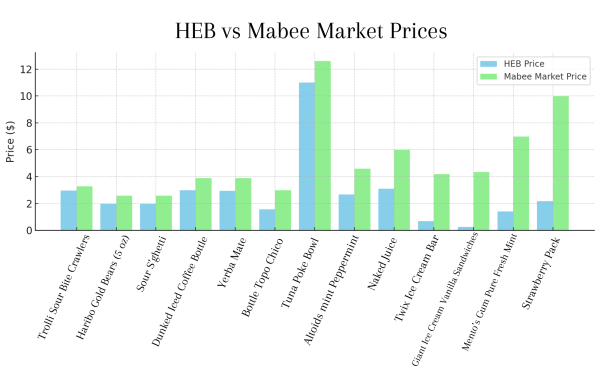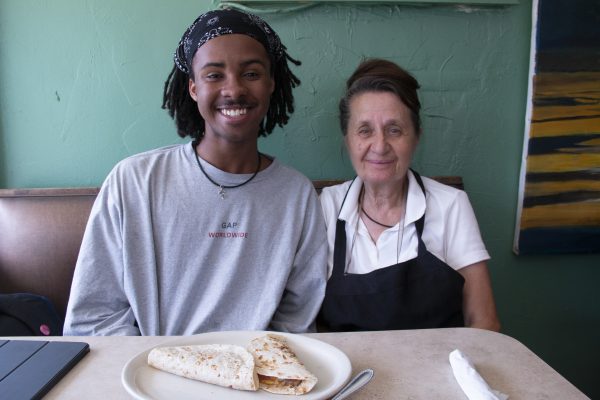TriniBaddies: The women of Trinity
Get to know some of the great women that lead the Trinity community.
March is internationally recognized as Women’s History Month (WHM), a time dedicated to celebrating the women who have fought and continue to fight for equality and justice in communities around the globe. This occasion serves as an opportunity to shine a light on women who have shaped and guided our learning community here on campus.
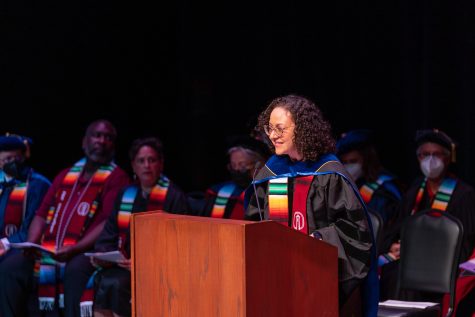
Dania Abreu-Torres
Dania Abreu-Torres is an associate professor for the department of modern languages and literature and also serves as the director of the Mexico, the Americas and Spain (MAS) program. Abreu-Torres discussed what drew her into teaching, and specifically how the world that literature creates has heavily impacted her career path.
“At first, I wanted to be a writer but then discovered that I love literature as a mechanism to understand and discuss the world at many levels. I wanted to share these discussions and teaching was the best method,” Abreu-Torres wrote in an email. “Sharing with students these readings and discussions is the best part of my day as I see them learning about the Caribbean or Latin America by immersing themselves in history and fiction and providing perspectives I may have not considered before. Is a give-and-take that I love.”
The Puerto Rican maxim, “Pa’lante. Pa’tras ni para coger impulso” which translates to, “Onward. Backward not even to get a push,” guides Abreu-Torres’ life. As a former women and gender studies co-director, Abreu-Torres has participated and organized several Women’s History Month events. To Abreu-Torres, Women’s History Month is an opportunity to celebrate women who are continuously left out of history.
“We celebrate women this month because women and other gender identities have been left out of history and many are fighting right now to leave them out,” Abreu-Torres wrote. “WHM is a moment to pause and acknowledge those historical gaps that we need to fill in, but also the progress we have made. Most of all, Women’s History Month celebrates the plurivocal progress women of all colors and identities have been able to create and the spaces we have thanks to them.”
Jane Childers
Jane Childers is chair of the psychology department, as well as the director of the linguistics program. Childers cited familial values as a firestarter of her passion for linguistics.
“My dad is a linguist so I grew up hearing about the innate capacity for language that infants have,” Childers wrote in an email. “I immediately started questioning that innateness.”
WHM is important to Childers as it acknowledges the feats of many women, especially women in STEM. Childers emphasized the role that past women have played in paving the way for future female researchers.
“It’s a celebration of the women who came before me and made this life possible. Women weren’t always able to be college professors — or even to go to college,” Childers wrote. “I especially like learning about the female scientists that led to my ability to do research today.”
Shannon Mariotti
Shannon Mariotti is a professor for the political science department, whose work focuses on political theory, ultimately guiding students to discover their own political ideas. Mariotti is a first-generation college student with an Ivy League degree and many years of teaching experience. As a woman of many accomplishments, Mariotti believes living life on a day-to-day basis with consistency is what truly creates significant achievements.
“I don’t tend to think of accomplishments in big momentous terms,” Mariotti wrote in an email. “I try to focus on the small-scale and everyday habits and practices that — done well and done consistently — generate the ‘big things.’”
Due to her background in political science, Mariotti understands the importance of WHM through a uniquely developed humanitarian lens. For Mariotti, Women’s History Month is necessary to shine a spotlight on the historical undermining of women.
“This month — like every other day actually — I would shine a spotlight on the necessary work of social reproduction, dependency work and care-taking. Social reproduction refers to the immediate, concrete and material ways that we sustain human life and meet human needs,” Mariotti wrote in an email. “This vital form of regenerative work — which has traditionally been ‘women’s work’ — is often hidden, devalued, disavowed, backgrounded and privatized in ways that disparately and uniquely impact women — across class, race and culture.”
Angela Tarango
Angela Tarango is a professor for the department of religion and the director of the Mellon Initiative for undergraduate research in the arts and humanities department. WHM is important to Tarango for a variety of reasons, especially as she strives to emphasize diversity in this commemoration of women. The notion of inclusivity was especially pertinent to her while going through the process of receiving her Ph.D., as she struggled to be one of the few women of color in her program.
“I think my single most important accomplishment is finishing my Ph.D.,” Tarango wrote in an email. “For me, the process of graduate school was really hard, and I had a hard time — I felt really alone in my program in some ways. There were no other Latinas in my program, and that wore me down more than I expected. So it felt like such a big accomplishment to actually finish and graduate.”
Tarango leads her life with the guiding principle of generosity, taught to her by her mother who would feed figs to rodents roaming her family garden. Growing up, Tarango’s father planted a fig tree for her mother because she loved figs, and when her dad would pick the figs her mother would tell him, “‘leave a little extra for the possums.’”
“She didn’t need them all, and the wild animals deserved to have some too,” Tarango wrote. “Basically, [“leave a little extra for the possums”] means to be generous, and not take more than what you need. Be generous with your time, your friendship, your talents. My mom is gone now, but the tree is still there — the possums get most of it now, but I carry her motto with me every day.”
Tarango attended an all-women’s university as an undergraduate, reinforcing her understanding that educating women can create true change in the world. Tarango’s assertion of the belief that women can be and do anything is a principle that has guided her life.
“I think we should celebrate women in all the varied roles that they take on in society but also take this moment to push for continuing educational, health and pay equality for women — all things that we do not yet enjoy as a society,” Tarango wrote. “We have to keep pushing if we wish to achieve those things as a society.”
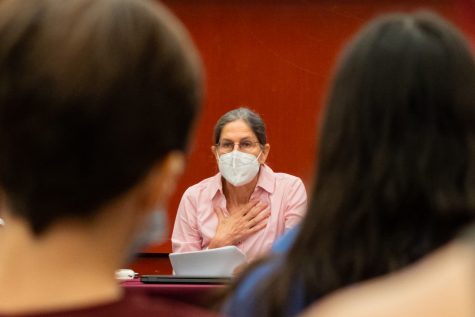
Judith Norman
Judith Norman is the chair of the philosophy department and teaches courses regarding topics from German idealism to existentialism. Norman fell in love with philosophy in her first year of college after learning what it means to have knowledge. Norman is not only a professor but a mother, social activist, marathon runner and most importantly, a cat lover.
Norman lives her life by a quote she encountered in a professional philosophy circle: “We’re all smart. Distinguish yourself by being kind.” With this leading principle in mind, Norman has taken the lead on a number of political movements ranging from anti-war and economic justice to Palestinian rights. In light of Women’s History Month, Norman is currently reading the poems of Layli Long Soldier, a revered Native American writer, author and activist.
Norman shared that Women’s History Month gives us the chance to not only tell but listen to new, untold stories.
“Too many historical narratives justify oppressive structures,” Norman wrote. “We need to hear more stories from the perspective of people who resisted oppression.”
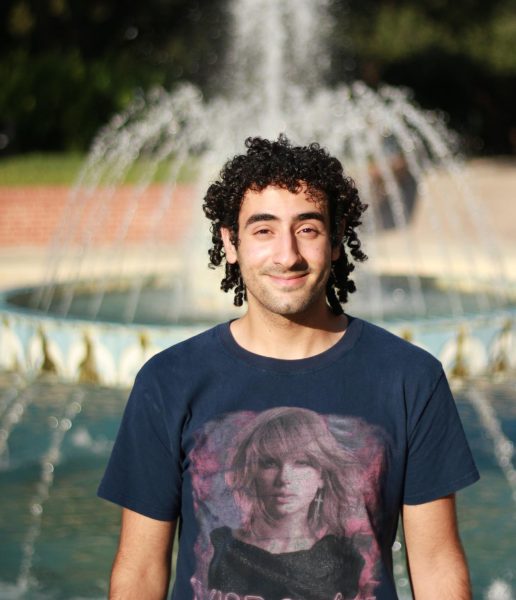
Hello! My name's Omar Ratrut and I'm a sophomore political science and sociology double major from San Antonio. Aside from the Trinitonian, I'm involved in...
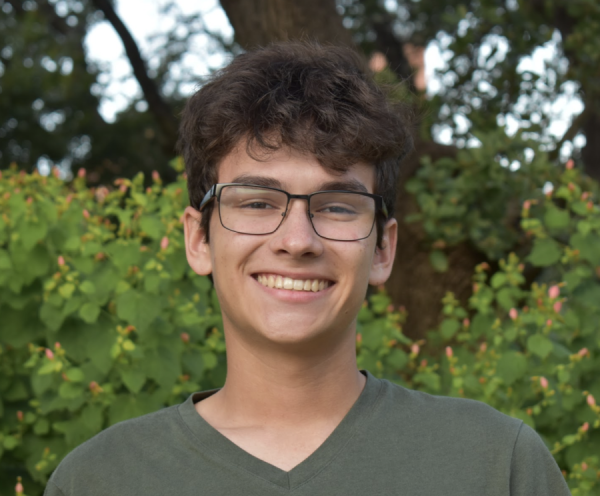
My name is Sam (he/him) and I'm a photographer here with the Trinitonian. I'm a senior Communications and German double major from Austin, Texas, and...




